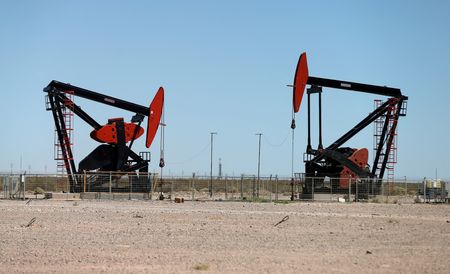 1
1 1
1

By Rowena Edwards
LONDON (Reuters) -Oil prices edged higher on Friday on hopes of a Chinese demand boost, but the broader global economic outlook kept crude benchmarks on course for a weekly decline.
Brent crude futures rose 56 cents, or 0.71%, to $79.25 a barrel by 1009 GMT.
U.S. West Texas Intermediate crude futures were up 60 cents, or 0.81%, at $74.27.
Both contracts rose by more than $1 earlier in the session.
China, the world’s largest crude oil importer, expects passenger traffic by road, rail, water and air during the coming Lunar New Year holidays to double from the same period in 2022.
China, the economy of which has been hit by another COVID wave, also announced more state support measures on Thursday.
Further support came from a higher than expected fall in U.S. distillate inventories in the week to Dec. 30, according to data from the Energy Information Administration (EIA) on Thursday. [EIA/S]
On a weekly basis, however, both the Brent and WTI contracts were on track to fall by more than 7% from the previous week, pressured by concern over the possibility of a global recession.
“The oil market might be regaining some composure following the bloodbath earlier this week, but the upside potential remains limited, at least in the near term. The economic outlook is clouded,” said PVM analyst Stephen Brennock.
The world’s top crude exporter, Saudi Arabia, lowered prices for the Arab light crude it sells to Asia to its lowest since November 2021 amid the global pressures hitting oil.
Markets now turn their attention to the closely watched U.S. payrolls report due later on Friday, with economists polled by Reuters forecasting the U.S. economy to have added 200,000 jobs in December.
“The jobs number will have a major influence, given that it could provide clues as to whether or not the Federal Reserve still plans on slowing down the economy,” said PVM’s Brennock.
(Reporting by Rowena EdwardsAdditional reporting by Emily Chow in SingaporeEditing by David Goodman)